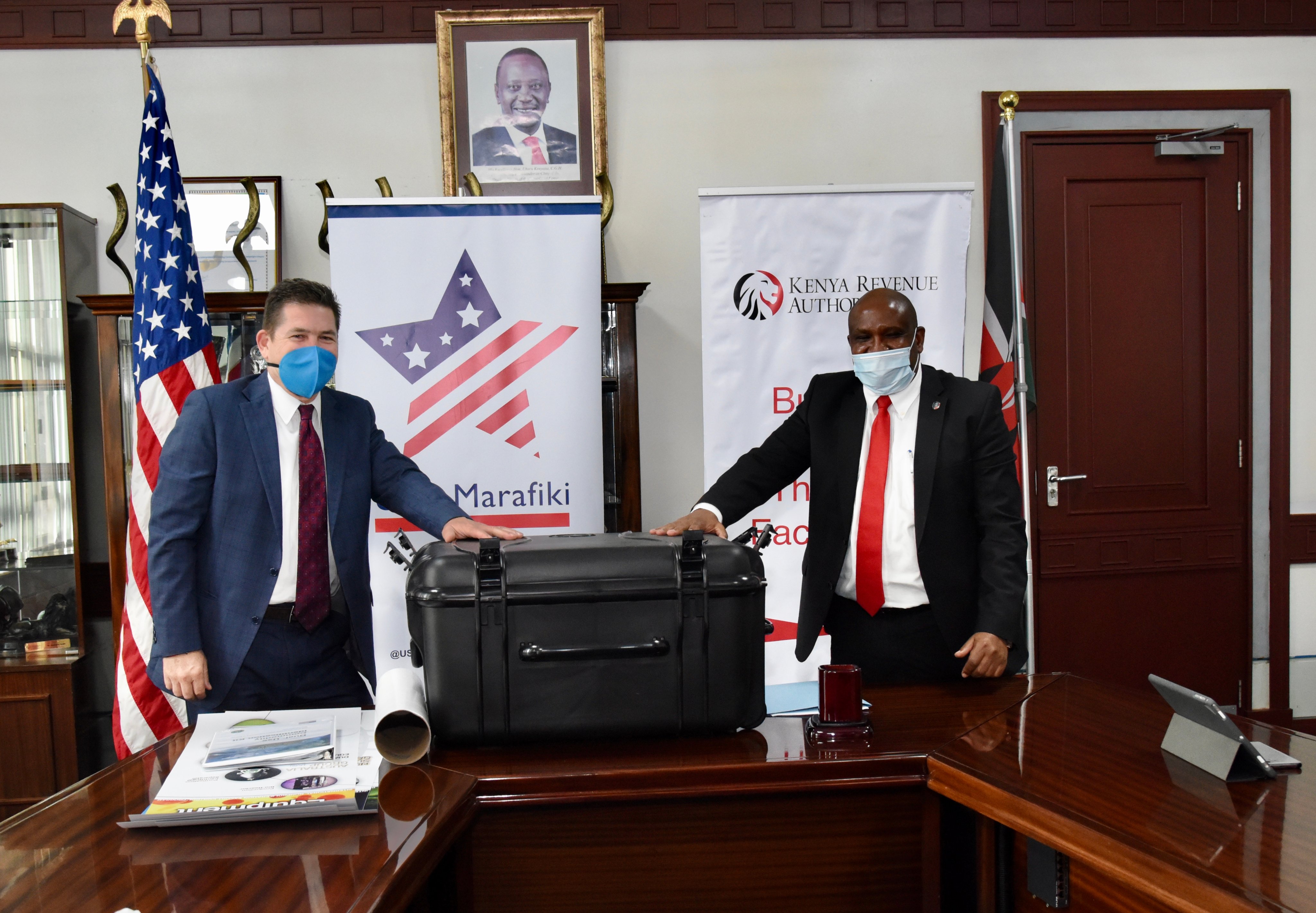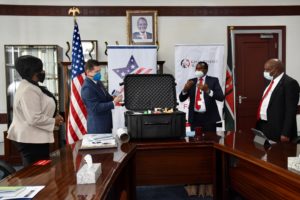News
United States Donates Border Security Training Materials to Kenya Revenue Authority

U.S. Ambassador to Kenya Kyle McCarter on May 15 made a donation of advanced Strategic Trade Control training materials to the Kenya Revenue Authority’s Kenya School of Revenue Administration (KESRA) as part of a longstanding partnership between the United States and Kenya to enhance border security and prevent potentially dangerous items from being illegally transferred into Kenya.
“The COVID-19 crisis reminds us all of how critical it is to be aware of what is transiting our borders and how that affects both human and economic security,” said Ambassador McCarter. “Kenya is a regional leader on these issues, and the United States has long supported Kenya’s efforts to build better systems for border and trade management. I am proud to continue our investments in the training of the front-line customs and border control officials who risk their health and safety to protect the public.”
KESRA is developing a comprehensive training curriculum on Strategic Trade Controls in partnership with the Kenya Nuclear Regulatory Authority and the U.S. National Nuclear Security Administration (NNSA), with support from the U.S. Department of State’s Export Control and Border Security (EXBS) Program. EXBS works with government agencies around the world to enhance their abilities to detect, interdict, seize, and prosecute illegal transfers of conventional arms as well as components for weapons of mass destruction (WMD). The EXBS Program is active in over 50 countries. In Africa EXBS partners are Kenya, Tanzania, Uganda, South Africa, Egypt, Libya, Morocco, Algeria and Tunisia.

U.S. Ambassador Kyle McCarter delivers a training kit for Kenya’s front line customs and border control officials to KRA Commissioner General Githii Mburu. These training materials will strengthen Kenya’s ability to secure its points of entry by detecting and seizing illegal transfers of controlled items into Kenya.
Through the support of the U.S. Government, 10 KESRA staff have been trained in Nairobi, Washington, D.C., and Brussels. EXBS is also working with a team from KESRA to develop the Strategic Trade Control Enforcement curriculum which will be offered across Africa from Nairobi.
“This is a legacy partnership for us at KRA. This is a great milestone in building the capacity of our staff in safeguarding the points of entry for the good of our nation. The kit has come in as the whole world grapples with the COVID-19 epidemic, and it will go a long way in building the capacity of our frontline staff,” said the Commissioner General, Mr. Githii Mburu.
KESRA is one of the four accredited Regional Training Centers of the World Customs Organization (WCO) in Eastern and Southern Africa. The new training materials will build the capacity of customs officers to recognize “dual-use” products and materials which may have legitimate civilian use but can also be used to manufacture or assemble weapons or weapons technology, including improvised explosive devices.
The NNSA’s International Nonproliferation Export Control Program has partnered with the Kenya Nuclear Regulatory Authority since 2012 to provide specialized Commodity Identification Training (CIT) materials to customs officers. The CIT Demonstration Kit donated today will give KESRA trainees the opportunity to handle sample dual-use items and provide a better understanding of how to identify them in the field.
Kenya Insights allows guest blogging, if you want to be published on Kenya’s most authoritative and accurate blog, have an expose, news TIPS, story angles, human interest stories, drop us an email on [email protected] or via Telegram
-

 Grapevine2 weeks ago
Grapevine2 weeks agoRussian Man’s Secret Sex Recordings Ignite Fury as Questions Mount Over Consent and Easy Pick-Ups in Nairobi
-

 News6 days ago
News6 days agoTHE FIRM IN THE DOCK: How Kaplan and Stratton Became the Most Scrutinised Law Firm in Kenya
-

 Investigations1 week ago
Investigations1 week agoMulti-Million Dollar Fraud: Three Kenyans Face US Extradition in Massive Cybercrime Conspiracy
-

 Economy1 week ago
Economy1 week agoIran Demands Arrest, Prosecution Of Kenya’s Cup of Joe Director Director Over Sh2.6 Billion Tea Fraud
-

 Business1 week ago
Business1 week agoA Farm in Kenya’s Rift Valley Ignites a National Reckoning With Israeli Investment
-

 Africa1 week ago
Africa1 week agoFBI Investigates Congresswoman Ilhan Omar’s Husband’s Sh3.8 Billion Businesses in Kenya, Somalia and Dubai
-

 Grapevine3 days ago
Grapevine3 days agoA UN Director Based in Nairobi Was Deep in an Intimate Friendship With Epstein — He Even Sent Her a Sex Toy
-

 Politics2 weeks ago
Politics2 weeks agoSifuna, Babu Owino Are Uhuru’s Project, Orengo Is Opportunist, Inconsequential in Kenyan Politics, Miguna Says
















